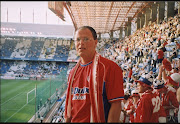 An unreliable sporting history of the Reds
An unreliable sporting history of the RedsPercy Bysse Kelley
It is, I suppose, a debatable point whether Shelbourne’s legendary chant composer, Percy Kelly is truly a legend or not. Can one be a legend if nobody has heard of you? Yet to all the tens of thousands that crowd the new stand every fortnight and roar on the team, his legacy lives on.
For example, that famous chant that has rung out at grounds from Croatia to Iceland and all places in between – ‘Shelbourne, Shelbourne, Shelbourne, Shelbourne’ – how many of today’s fans know that was a Percy Kelly original? Borrowing the melody from an old Doris Day B-side, (‘Show me your Colt 45, cowboy, and I’ll be up in the saddle tonight’) he crafted lyrics to represent the very essence of the club, writing and rewriting for months until he came up with the words we know today.
Percy Kelly was born some time between 1932 and 1934 (experts tend to go for 1933), a stone’s throw from Shelbourne Park, providing the stone was smaller than your hand. (And bigger than a grain of sand. The size of a hard boiled egg, that kind of area.)
From an early age, he decided to become a poet and deliberately developed consumption to aid him in his career. He bought an attic and struggled in it on a daily basis but the big break did not come, except for one poem about what he did on his holidays that was published in Ireland’s Own.
At the end of the fifties, when many people were wondering which decade would come next, Percy turned his quite inconsiderable talents to penning football chants for junior side Young Boys of Berne, including the now universal ‘Come and have a go if you think your hard enough’ and the not-quite-so-well-known ‘It’s certainly possible that if you persist in such loutish behaviour, you might sustain a serious head injury,’ which was later made into a film starring Burt Lancaster.
Naturally, such poetic talents did not go unnoticed and after a fierce bidding war involving Cork Inexcusables, Waterford and Estudiantes, Kelly was signed by Shelbourne for £5 and one of those pens that writes four different colours.
The ten years that Kelly spent with Shels, between 1959 and 1962, was a veritable golden age of football chanting in Ireland. Alfred Lord Dennison was working with Bohemians; Sam the Sham Beckett was at Milltown and Sir John Betjeman was whipping up the crowds at Athlone. The four of them used to meet up in McDaid’s until a nasty altercation over who had first come up with Shelbourne/Rovers/Bowez/Athlone –clap, clap, clap.
Within six weeks of arriving at the club, Kelly had written the somewhat esoteric lyrics to ‘We are Shels,’ still heard at matches today. “I agonised over the last line for a fortnight,” he confessed to Hello magazine later. “Should I go for three ‘We are Shels’ or only two? In the end, he phoned Cole Porter, who advised him to go with the latter.
He is credited also with the Indian war chant, though a Nahavo Indian in Flagstaff, Arizona, who coincidentally was Kelly’s life partner at the time, (even though the two had never met) attempted to get a court order against its use. “It was the only chant I could never put decent lyrics to,” Kelly once confided to marinologist Jacques Cousteau, who simply raised his eyebrows and shrugged.
Of course, there were many Kelly blueprints that never saw the light of day. ‘We’re not Barcelona and we’re not Athletico Madrid neither’ was one that singularly failed to spark the imagination of the Shels faithful. ‘When Jayo went to Poland’ was deemed by the literary critic section of the crowd to be too far ahead of its time and was dropped for 45 years until circumstances allowed it to be resurrected. And for some strange reason, ‘We quite admire you, Shelbourne, we do’ – now deemed by experts to be a minor classic of the genre – was dropped after one airing against Cork Crustaceans.
Kelly died in 1966, three years after he was buried in Glasnevin Cemetery. The simple headstone is inscribed with words from another of his songs that never quite made it – ‘I lay, I lay, I lay.’




No comments:
Post a Comment